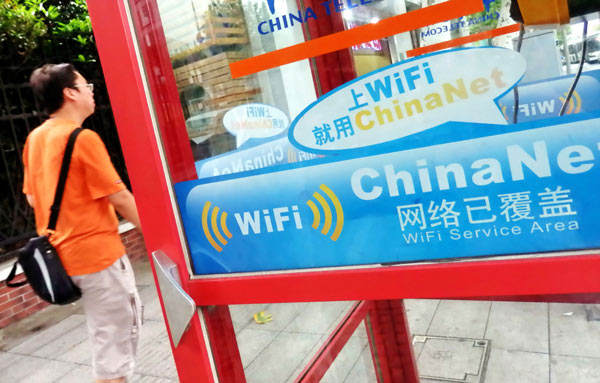Mounting calls for free access to Wi-Fi
Updated: 2012-10-03 09:18
By Eric Jou and Liu Qing (China Daily)
|
||||||||
Getting on the Net for free in urban areas with mobile devices may be just a click away, Eric Jou and Liu Qing report.
Cellular dead spots, Wi-Fi networking holes. In today's hyper-connected world, not being on the Internet for many people can be a lonely experience, perhaps akin to being stranded in the desert.
However, the fear of being disconnected may soon be at an end in major cities across China as the concept of a metropolis with free and open wireless connectivity becomes increasingly realistic.
There are more than 538 million users connected to the Internet in China, according to the analysis group China Internet Network Information Center, many of whom link to it through wireless devices. According to the research company IHS, the number of smartphone shipments within China this year is estimated to be 164 million. Whether all will be sold is another matter.
 |
|
Major Chinese cities have been launching more free Wi-Fi hotspots for the public. [Photo by Jing Wei / For China Daily] |
A smartphone has more advanced computing and Internet connectivity options than a regular-feature phone plus the ability to download a host of specialized applications.
With so many people using their phones to access the Internet, wireless connectivity has become a key issue in cities across the country.
Wang Boyan, 26, from Beijing, says he needs to be connected every day for his work as an engineer for China National Radio and consequently he's out of the office a lot of the time.
"I connect to the Internet a lot when I'm outdoors for things such as reading the news, using QQ or Weixin (chat programs) and searching for maps," Wang said.
"I think more Wi-Fi hotspots should be launched to increase the coverage rate as well as surfing speed."
Wang says his preference is to use Wi-Fi whenever possible because the speed is faster than connecting to the regular cellular network. While there are locations such as coffee shops and restaurants that offer free Wi-Fi as an incentive to get customers through the door, these services end once he or she leaves. Beijing only offers free Wi-Fi to the public in six downtown locations.
What Wang wants is a wireless city, one that provides wireless Internet to everyone within the city limits. Anyone with a Wi-Fi-capable device can connect to the free public wireless network offered by the city and, once connected, users can do whatever they normally do online. Many Chinese cities are currently working on becoming wholly wireless.
Edgar Figueroa, chief executive officer of the Wi-Fi Alliance, a trade association representing more than 520 companies in the Wi-Fi industry from around the world that also certifies products using Wi-Fi technology, says that China is very important for the Wi-Fi industry and the Wi-Fi industry is important to China.
 |
|
A billboard promotes telecommunication and Internet connection in Beijing. [Photo by Zhan Jun / For China Daily] |
- 11 areas in Beijing offer free wifi
- Singapore begins pilot deployments of Super Wi-Fi
- Wi-Fi firm looks to hotels, universities
- Telecom carriers to look into mobile Internet
- Internet industry to stimulate economy: Minister
- Internet access closes rural-urban education gap
- Internet savvy voters targeted on social media
- Internet giants offer 30 minute idea pitch

 Relief reaches isolated village
Relief reaches isolated village
 Rainfall poses new threats to quake-hit region
Rainfall poses new threats to quake-hit region
 Funerals begin for Boston bombing victims
Funerals begin for Boston bombing victims
 Quake takeaway from China's Air Force
Quake takeaway from China's Air Force
 Obama celebrates young inventors at science fair
Obama celebrates young inventors at science fair
 Earth Day marked around the world
Earth Day marked around the world
 Volunteer team helping students find sense of normalcy
Volunteer team helping students find sense of normalcy
 Ethnic groups quick to join rescue efforts
Ethnic groups quick to join rescue efforts
Most Viewed
Editor's Picks

|

|

|

|

|

|
Today's Top News
Health new priority for quake zone
Xi meets US top military officer
Japan's boats driven out of Diaoyu
China mulls online shopping legislation
Bird flu death toll rises to 22
Putin appoints new ambassador to China
Japanese ships blocked from Diaoyu Islands
Inspired by Guan, more Chinese pick up golf
US Weekly

|

|






